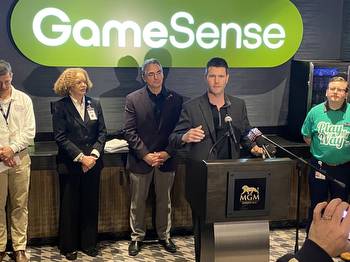Research on gambling problems was central to Massachusetts' casino law, but scope has been reduced

Massachusetts’ 2011 casino legislation mandated research into the health and economic effects of the industry, to the praise of many who work on gambling problems.
But the research budget has been going down even as gambling has expanded, leaving the body of knowledge more limited than some had hoped.
In 2013, researchers in Massachusetts launched what was considered a landmark study about gambling. They contacted 10,000 people in the state — before any casinos were open.
“In order to understand how gambling problems emerge and even, in many cases, are resolved, you have to follow the same people over time,” said UMass Amherst professor Rachel Volberg, who heads the state’s current gambling research.
That method is called a “cohort study.” It was one of two types of gambling research that Massachusetts launched at the time.
About 3,000 people from the original study agreed to be contacted again a couple years later. About half of them were considered at high risk of gambling problems.
Researchers wanted to know how the introduction of casinos in the state affected gambling behavior, Volberg said.
“Do financial problems come before the gambling or do they follow the gambling? When do people manifest problems, and what order?” she said.
During the initial survey, Volberg’s team found 2% of the state’s population had severe gambling problems affecting their finances, jobs, or relationships. Another 8% were at risk.
Judging from follow-up surveys, those numbers didn’t change after casinos arrived in Massachusetts. Volberg said that's likely because many people had already been gambling in other states.
But researchers found that some people did switch back and forth among gambling categories — between recreational and problematic.
“People develop gambling problems and often resolve those problems without necessarily seeking treatment,” Volberg said.
Like other types of addiction, she added, “not everybody who tries a substance or who tries an activity becomes an addict.”
The research also found that, over time, fewer people — not more — knew where or how to get help for their gambling problems.
Meanwhile, many questions remained: What are the signs that might predict problem gambling in a person? As gambling expands in the state — like this year into sports betting — would those people find help?
But researchers won’t know, because in 2019 — five years into the cohort study, after four follow-up surveys with the same group of people — it ended. That was only a year after MGM Springfield opened.
“It was a disappointment,” Volberg said. “If we had been able to maintain the cohort for maybe another five years, it would have been really amazing because we would have been able to cover the introduction of sports betting as well."
“But, realistically," she said, "it was a very expensive study.”
'There's always room to grow'
Massachusetts is often hailed as a model for how much money it does dedicate to gambling research — more than any other state, according to a 2021 survey by the National Association of Administrators of Disordered Gambling. Only 15 states reported doing any research at all.
Since there’s no national office for gambling research, nor federal funding stream, states are left to come up with their own plans and budgets from scratch.
Keith Whyte, who heads the National Council on Problem Gambling, said that some states avoid gambling research by design.
“I think that most state legislators are either making too much money or are hopelessly cynical about problem gambling,” Whyte said. “And they realize that by refusing to fund prevalence studies, they can make it harder to detect that they've created these problems in their own states, or that they're refusing to respond.”
In contrast, Massachusetts’ gambling legislation actually required studies into problem gambling, using a portion of casino revenues that goes into what’s called the Public Health Trust Fund.
Debate over who controls the money
This year, the Massachusetts Gaming Commission said the trust fund has a total of $24 million. The commission has access to a quarter of that — about $6 million — a percentage that has been going down year by year, as called for in a previous agreement. That amount covers both research and responsible gaming programs.
“It covers our current scope of what we're attempting to do,” said Mark Vander Linden, who oversees that division for the commission. “Is there room to grow? There's always room to grow.”
Vander Linden said funding was only one reason they ended the cohort study, which had cost just under $1 million a year. He said study subjects also began to drop off each time there was a new survey, so the cohort lost value over time.
But as sports betting takes off, he added, “Do we need to come back and reconstitute a cohort study? I would say it's certainly on the table for the commission to consider.”
Steve Crosby, former chair of the gaming commission, is critical of the way the trust fund is distributed. He thinks more should go to the commission.
“The mandate that came from the Legislature [was] for a very aggressive and comprehensive research agenda and … to keep the harm of problem of gambling to a minimum,” Crosby said. “And the the gaming commission isn't able to do either with 25% of the budget only.”
The Department of Public Health gets the rest — somewhere between $11 and 18 million for treatment and prevention — although the DPH and the Gaming Commission gave different numbers for the last fiscal year.
Victor Ortiz, who runs the DPH Office of Problem Gambling, spoke last spring at a meeting of the state’s Public Health Council.
“It's imperative that the resources continue to be housed in the Department of Public Health,” Ortiz said, “so that there's a separation of and a firewall between the industry and the public health work that's necessary to mitigate these harms.”
Ortiz said later, in an interview, he wasn’t aware the cohort study ended but that "all of us in state government have to make fiscal decisions based on the realities and what the priorities are.”
New research agenda going forward
Meanwhile, Vander Linden pointed to a second, major gambling study in Massachusetts that analyzes information collected before casinos were opened. The SEIGMA study, which is also overseen by Volberg, looks at economic and social effects of gambling on the general population over time — though not, like the cohort study, on individuals.
Among that study’s findings: men are three times as likely as women to develop gambling problems; Black people are four more times more likely than whites; and gambling problems often go hand in hand with other mental health conditions, like depression, anxiety and alcohol addiction.
Going forward, Volberg plans to look at how many people in Massachusetts are in treatment for gambling addiction — a trend the Department of Public Health does not track. She hopes her team's research helps inform public health policy, although she said she hasn’t been contacted by the state’s public health leaders.
“It would be wonderful if the findings that we have generated about gambling in Massachusetts were incorporated in prevention messaging and information about availability of treatment,” Volberg said. "[So far] I don't see that."
The Massachusetts Gaming Commission comes up with a new research agenda annually. This year, the commission said it will focus on the effects of online gambling, impacts on youth, budgeting tools for sports betting, and what could happen if convenience stores are allowed to have sports betting kiosks.



































